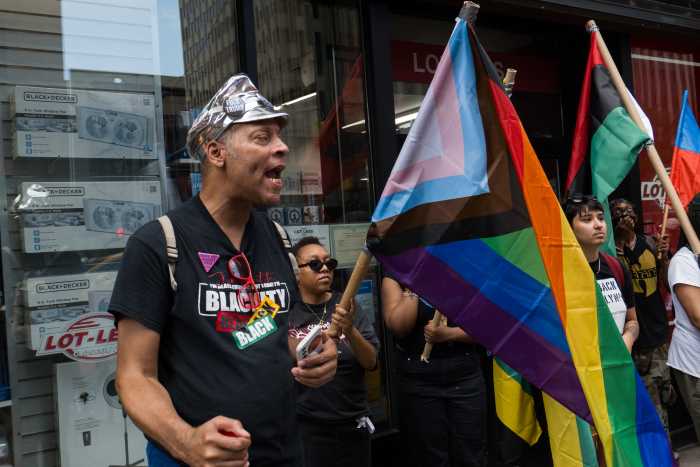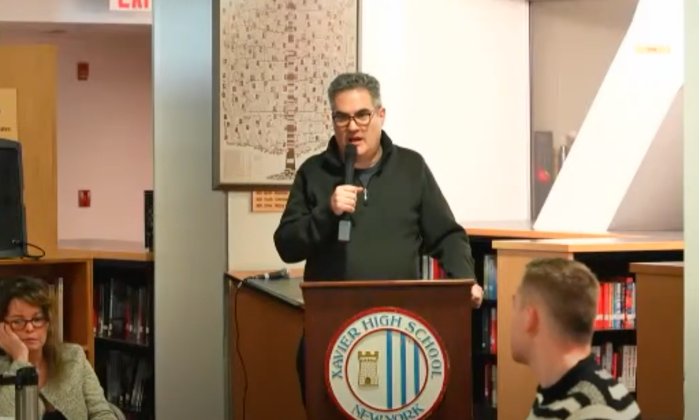William Brandon Lacy Campos. | COURTESY: DAVID BERUBE
William Brandon Lacy Campos was a spoken word poet well known and highly regarded in the writer and arts communities of Minneapolis, Oakland, and New York. He was also a novelist whose debut work is set for publication early next year. A social justice activist across many queer communities of color, he was, as well, a dedicated blogger whose raw honesty, anger, and emphatic certainty could startle and even put people off.
His closest friend told Gay City News he was “mildly crazy”; in a moving tribute on the Huffington Post, another friend wrote, “Brandon would do some crazy shit.”
When Campos died on November 9, just four days after delivering the keynote address at the Black Solidarity Day Rally at Tufts University in Medford, Massachusetts, he was only 35.
While the circumstances of his death remain a mystery — he seemingly held nothing back in recounting his story of past crystal meth addiction, and the New York City Medical Examiner’s Office has not yet concluded an autopsy — there is no mystery about the devotion he elicited among those whose paths he crossed.
“We consider each other family,” said David Berube, a visual artist who was Campos’ partner for several years and had lived with him another year and a half since their romantic relationship ended in mid-2011.
For many New York couples, remaining roommates after breaking up is an unenviable side effect of the city’s insane housing market. For Berube and Campos, nothing could be further from the truth.
“Our relationship only heightened with time,” Berube said. “It was impossible to lose this sort of person. There was much more to the relationship than being boyfriends. It was more than any other relationship I’ve had in my life.”
Published by REBEL SARTORI PRESS
Among the things the two men shared was a work bond; in 2011, they published “It Ain’t Truth If It Doesn’t Hurt,” a book of Campos’ poetry and Berube’s artwork.
Their friendship, while living together as former lovers, Berube explained, was strong enough to make room for new romantic partners in each of their lives. At his death, Campos was survived by boyfriend Nicolas Gerard.
According to Berube, he was not the only one deeply affected by what could be called Campos’ urgent charm.
“I saw how many people he touched,” he recalled. “People are so enamored by him, by his passion. With Brandon, there was no middle ground, he was way up or way down, and had no time for the middle ground, no time for the hypocrisy. He would enter a room and very quickly become the center of everyone’s attention.”
Campos, Berube said, had a broad, embracing definition of family. Among his survivors, Berube mentioned his mother, Deborah Watt, her son Jason Strother, and her husband Cordell Watt; Campos’ father William Edward Lacy and Brandon’s three siblings, Jasmine, Shannon, and Julius Lacy; as well as Clinton and Ella Strother, Meta Mandich, and their mother Melanie Quillin.
Berube mentioned other “family” survivors who had no blood or legal relationship to Campos. One of those survivors is Rodrigo Sanchez-Chavarria, a writer and spoken word poet whom Campos met more than a decade ago in Minnesota, where he was raised. The two were part of a group who founded a Latin@ poets collective, Palabristas (Word Slingers).
Like Berube, Sanchez spoke about Campos in terms of family. The two played soccer together and collaborated on work including a poem titled “Swine Flu.” Campos always made time to see Sanchez on his visits back to Minnesota — often holding barbeques — since moving to Oakland and later New York about four years ago. Last year, Campos returned to Minnesota to stand as godfather to Sanchez’s infant son Santiago, and in August, Sanchez and his family, including two daughters who called Campos Tia Brandon (using the Spanish word for aunt), accompanied Campos on a visit to see Brandon’s mother in Duluth.
“Brandon taught me a lot about love,” Sanchez said. “He had his blood family, but he brought the idea that you choose your family. That to me was very empowering and powerful. For a lot of us that he referred to as family, that was an extreme honor.”
In Minneapolis, Campos’ world extended beyond writers and artists, also including activism and scholarship. He wrote proudly about being “the only non-PhD candidate” to have written a chapter in “Queer Twin Cities,” a 2010 LGBT oral history. He was also a contributor to “Beyond Resistance! Youth Activism and Community Change: New Democratic Possibilities for Practice and Policy for America's Youth,” a 2006 book.
Campos was living in Oakland when a mutual friend introduced him to Berube online. The two began a lengthy Internet friendship and in time a bicoastal relationship. As Campos made plans to move to New York, he got in touch with Charlie Vázquez, a writer, artist, and musician who was hosting a monthly reading series in the East Village called Hispanic Panic. The two went on to collaborate on a dozen or so reading projects, from the New York Public Library to a series Campos hosted on behalf of the Green Party in Long Island City.
Last year, Vázquez and Charles Rice-González included a contribution by Campos in their published collection, “From Macho to Mariposa: New Gay Latino Fiction.”
Several years before Campos arrived in New York, Emanuel Xavier, a poet and writer here in the city, met Campos at a writers’ conference in Minneapolis. Campos later contributed to Xavier’s “Mariposas: A Modern Anthology of Queer Latino Poetry.”
Xavier and Vázquez introduced Campos to Rebel Satori Press, where both men had relationships. It was that press that came out with “It Ain’t Truth If It Doesn’t Hurt” last year and is finalizing publication of Campos’ novel, “Eden Lost.” His editor at Rebel Satori wrote that the book is a “supernatural and extraordinary” account of a survivor of a painful childhood written in a style that is “lyrical and down to earth and very ‘real’ (no bullshit, no pulling punches), just like his poetry but this time in prose.”
Campos, in fact, had a troubled youth — suffering physical abuse early on and, later, as a young adult, sexual abuse. He lived with HIV for years and, in his online writings, made no effort to contain his fury at those who contributed to the ongoing stigma faced by those in his situation.
Last month on his blog, myfeetonlywalkforward.blogspot.com, Campos wrote, “The next time you are posting an ad for a piece of ass or a dick for that ass and you post that you are clean and looking for clean, I sure hope you mean that you have washed your ass in bleach and are looking for someone that has done the same… because if you are using ‘clean’ to refer to yourself as being HIV-negative, then let me be so kind as to tell you that the connotative definition of your identity is that being HIV-positive is dirty.” He ended the posting by writing, “Check yourself… or I promise you… I will.”
Campos brought the same no-holds-barred tone to much of his writing, from the personal — whether concerning the despair and disintegration he experienced on meth and his struggle to not go back there or the torment he felt having Berube’s ex live with them for a time as they began their relationship — to the political. In fact, for all his writings’ nakedness about his personal life, politics and activism were major themes of the work produced by Campos, who served for a time as co-director of Queers for Economic Justice and sat on the board of the Audre Lorde Project, a community center for queers of color.
In 2011, responding to a blogger who wrote a series of posts he viewed as transphobic, Campos wrote, “Here is the part where you as a white person need to shut up, sit down, and never ever speak again. You as a white woman do not now have and never will have the right to EVER SPEAK or COMMENT or in any way have an OPINION on the right of queer and trans people of color to self organize around our commonalities.”
In a recent Facebook post urging support for President Barack Obama’s reelection, he wrote, “Not voting isn't a protest, it is an abrogation of your most minimal democratic obligation. Don't vote; relocate. Danke! Gracias! Merci! Obrigado! Salamat po! Grazie!”
And in his speech two weeks ago at Tufts, he tackled a recurrent theme in his life — his status as a multi-racial man.
“I am standing in front of you a black, white, Ojibwe, Afro-Boricua, HIV-positive queer man,” he said. “And I am just as black as any of you… No more high yellow and midnight blue conversations when talking about skin unless it’s to talk about how that high yellow or midnight blue person rocked your socks last night after that party and you are about to take his or her last name. I could give a damn about the style you wear your hair, fried died and laid to the side or afro-tastic, I am with Miss India.Arie, I am not my hair!”
It was Aundaray Guess, a performance artist who heads up Project Wipeout, which combats HIV stigma in faith-based institutions, who wrote on Huffington Post that Campos “would do some crazy shit.”
But Guess’ essay continued with praise that was both extraordinary and completely in line with what others have witnessed about Campos’ life.
“Sometimes the posts on his Facebook page would qualify as too much information, but in all honesty he did what a lot of us are so afraid to do: He lived,” Guess wrote. “He made his life have meaning and a purpose, and he didn't forget to have fun. He loved to love, and he loved to be in love. And that's what I feel made people gravitate to him. Simply look at his Facebook page and you'll see people from all walks of life. You'll see a rainbow of genders, sexual orientations, nationalities, and perspectives. And just from reading the last few days' posts, you'll see that he was someone who took the time to actually connect with people face-to-face, person-to-person, and who cooked from his soul as he fed not only stomachs but hearts.”
On Tuesday, December 4 from 6-7:30 p.m., William Brandon Lacy Campos' life will be celebrated in stories, remembrances, and poems by and about him. Those reading will include Charles Rice-González, Emanuel Xavier, Cris Izaguirre, and Charlie Vázquez. The mic will be open for others who wish to share. Bar-tini Ultra Lounge, 642 Tenth Avenue, between 45th and 46th Streets. For more information, visit facebook.com/events/120851958074160/.




































